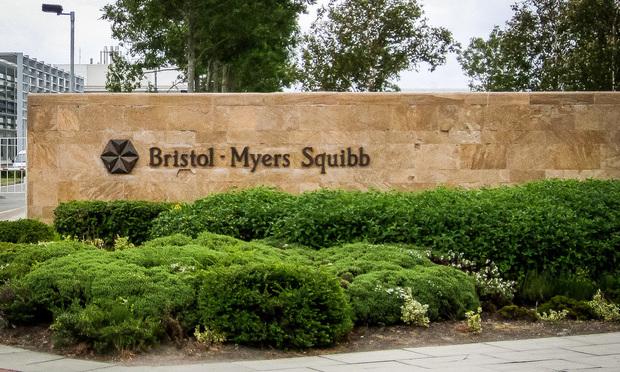Bristol-Myers' $74B Deal to Buy Celgene Prompts Investor Suit
According to the complaint, Celgene and its directors held the deal out as a premium to its stockholders, despite allegedly rejecting a previous offer from Bristol-Myers with an aggregate value of $110 per share.
March 13, 2019 at 12:00 PM
4 minute read
The original version of this story was published on Delaware Business Court Insider
 Bristol-Myers Squibb. Photo: Rept0n1x via Wikimedia Co
Bristol-Myers Squibb. Photo: Rept0n1x via Wikimedia Co
An investor in Celgene Corp. on Monday sued over Bristol-Myers Squibb Co.'s planned $74 billion acquisition of Celgene, saying that the deal undervalued the company and its cancer therapies that are in the development pipeline.
The stockholder class-action lawsuit, filed by Hollywood, Florida-based law firm Mager Paruas in Delaware Chancery Court, claimed that Bristol-Myers was “taking advantage” of a temporary decline in Celgene's stock price to offer investors an estimated $102 in total value for each share they own in Celgene. Bristol-Myers' headquarters are in New York City.
According to the complaint, Summit-based Celgene and its directors held the deal out as a premium to its stockholders, despite allegedly rejecting a previous offer from Bristol-Myers with an aggregate value of $110 per share.
“Celgene common stock is trading at depressed levels as the company is at the bottom of a business cycle that is expected to improve,” the complaint said. “A fair price cannot be based on a purported 'premium' over a depressed market price and the $102 price is unfair to stockholders.”
Celgene and Bristol-Myers announced the deal Jan. 3, saying the tie-up would create a “leading focused specialty biopharma company” for treating cancer, inflammatory, immunologic and cardiovascular diseases.
“Combining with Bristol-Myers Squibb, we are delivering immediate and substantial value to Celgene shareholders and providing them meaningful participation in the long-term growth opportunities created by the combined company,” Celgene chief executive Mark Alles said in a joint press release.
Under the agreement, Celgene investors would come to own 31 percent of the combined company, receiving one Bristol-Myers share and $50 in cash for each Celgene share they owned. The deal also provided one “contingent value right” to each Celgene investor that would entitle the holder to potentially receive a one-time payment of $9.00 per share if a slate of Celgene drugs receive approval from the U.S. Food and Drug Administration ahead of certain deadlines.
But Mager Paruas said the agreement valued the three drugs at $6.3 billion—far below the $40 to $50 billion the firm claimed they would be worth over five years. Because the payment was deadline-based, the new management of the post-merger company would have “every incentive” to delay the approval process, the complaint said.
Spokespersons for Celgene and Bristol-Myers did not immediately respond Tuesday to calls seeking comment on the lawsuit.
The complaint also targeted Celgene's officers and directors for allegedly breaching their financial duties in pursuing the deal. According to the filing, Alles and Celgene's other executives would receive large severance payments if they quit or were fired from the company within two years of the merger closing.
Alles in particular, the filing alleged, had “used his influence” to get the board to approve the merger, which would entitle him to a cash payment of three times his annual salary base if he resigns with good reason or is terminated without cause. Absent a deal, Alles would only be entitled to twice his annual salary under those circumstances, it said.
“These executives who stand to personally profit from the proposed transaction are the same individuals who are responsible for the creation of the company's projections and models upon which the board relied in determining that the proposed transaction was fair to stockholders,” Mager Paruas' attorneys wrote.
The lawsuit, now the second to challenge the deal in Delaware Chancery Court, seeks an injunction to halt a stockholder vote on the merger, which is currently slated for April 12.
Mager Paruas is represented by Michael E. Criden and Lindsey Grossman of Criden & Love in South Miami and Lee Squitieri of Squitieri & Fearon in New York. Carmella P. Keener of Rosenthal, Monhait & Goddess is acting as local counsel in the case.
An online docket-tracking service did not list counsel for Celgene, its executives or Bristol-Myers.
The case, captioned Mager Paruas v. Alles, has not yet been assigned to a judge.
This content has been archived. It is available through our partners, LexisNexis® and Bloomberg Law.
To view this content, please continue to their sites.
Not a Lexis Subscriber?
Subscribe Now
Not a Bloomberg Law Subscriber?
Subscribe Now
NOT FOR REPRINT
© 2025 ALM Global, LLC, All Rights Reserved. Request academic re-use from www.copyright.com. All other uses, submit a request to [email protected]. For more information visit Asset & Logo Licensing.
You Might Like
View All
NJ Firm Narrowly Avoids Case Dismissal Over Lengthy Complaint Filed in Fed Court
4 minute read
AstraZeneca Files Flurry of Lawsuits to Protect Cancer Treatment Drug
3 minute read

Trending Stories
- 1Decision of the Day: Judge Dismisses Defamation Suit by New York Philharmonic Oboist Accused of Sexual Misconduct
- 2California Court Denies Apple's Motion to Strike Allegations in Gender Bias Class Action
- 3US DOJ Threatens to Prosecute Local Officials Who Don't Aid Immigration Enforcement
- 4Kirkland Is Entering a New Market. Will Its Rates Get a Warm Welcome?
- 5African Law Firm Investigated Over ‘AI-Generated’ Case References
Who Got The Work
J. Brugh Lower of Gibbons has entered an appearance for industrial equipment supplier Devco Corporation in a pending trademark infringement lawsuit. The suit, accusing the defendant of selling knock-off Graco products, was filed Dec. 18 in New Jersey District Court by Rivkin Radler on behalf of Graco Inc. and Graco Minnesota. The case, assigned to U.S. District Judge Zahid N. Quraishi, is 3:24-cv-11294, Graco Inc. et al v. Devco Corporation.
Who Got The Work
Rebecca Maller-Stein and Kent A. Yalowitz of Arnold & Porter Kaye Scholer have entered their appearances for Hanaco Venture Capital and its executives, Lior Prosor and David Frankel, in a pending securities lawsuit. The action, filed on Dec. 24 in New York Southern District Court by Zell, Aron & Co. on behalf of Goldeneye Advisors, accuses the defendants of negligently and fraudulently managing the plaintiff's $1 million investment. The case, assigned to U.S. District Judge Vernon S. Broderick, is 1:24-cv-09918, Goldeneye Advisors, LLC v. Hanaco Venture Capital, Ltd. et al.
Who Got The Work
Attorneys from A&O Shearman has stepped in as defense counsel for Toronto-Dominion Bank and other defendants in a pending securities class action. The suit, filed Dec. 11 in New York Southern District Court by Bleichmar Fonti & Auld, accuses the defendants of concealing the bank's 'pervasive' deficiencies in regards to its compliance with the Bank Secrecy Act and the quality of its anti-money laundering controls. The case, assigned to U.S. District Judge Arun Subramanian, is 1:24-cv-09445, Gonzalez v. The Toronto-Dominion Bank et al.
Who Got The Work
Crown Castle International, a Pennsylvania company providing shared communications infrastructure, has turned to Luke D. Wolf of Gordon Rees Scully Mansukhani to fend off a pending breach-of-contract lawsuit. The court action, filed Nov. 25 in Michigan Eastern District Court by Hooper Hathaway PC on behalf of The Town Residences LLC, accuses Crown Castle of failing to transfer approximately $30,000 in utility payments from T-Mobile in breach of a roof-top lease and assignment agreement. The case, assigned to U.S. District Judge Susan K. Declercq, is 2:24-cv-13131, The Town Residences LLC v. T-Mobile US, Inc. et al.
Who Got The Work
Wilfred P. Coronato and Daniel M. Schwartz of McCarter & English have stepped in as defense counsel to Electrolux Home Products Inc. in a pending product liability lawsuit. The court action, filed Nov. 26 in New York Eastern District Court by Poulos Lopiccolo PC and Nagel Rice LLP on behalf of David Stern, alleges that the defendant's refrigerators’ drawers and shelving repeatedly break and fall apart within months after purchase. The case, assigned to U.S. District Judge Joan M. Azrack, is 2:24-cv-08204, Stern v. Electrolux Home Products, Inc.
Featured Firms
Law Offices of Gary Martin Hays & Associates, P.C.
(470) 294-1674
Law Offices of Mark E. Salomone
(857) 444-6468
Smith & Hassler
(713) 739-1250






